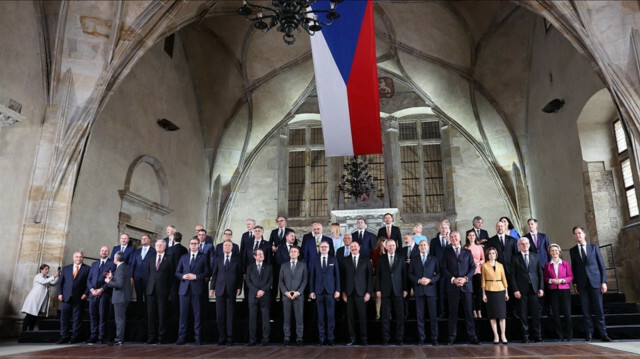
Leaders of 44 European states, including Türkiye, UK, start ‘strategic discussions’ on continent’s security, stability
The first summit of the European Political Community, a pan-European leaders’ platform to discuss common challenges, kicked off on Thursday in Prague, the Czech capital.
“Look at the importance (of this meeting), the whole continent is here except two countries, Belarus and Russia,” Belgian Prime Minister Alexander De Croo told reporters on the way to the summit.
Heads of state and government from 44 countries – the 27 EU members and 17 other European countries, including Türkiye, the UK, Serbia – participate at the summit hosted by the Czech government that assumes the rotating presidency of the Council of the European Union.
De Croo said the leaders will address the “extremely important topic” of European security at their meeting, with the aim to improve the security environment, prepare for further escalation of the Ukrainian conflict, and handle the energy crisis and inflation.
French President Emmanuel Macron, who proposed in May to set up the European Political Community, called the summit an “important moment” since it brings the “message of European unity” and starts “strategic discussions that have not existed before.”
He expressed hope that the leaders will be able to agree on common projects because “we share the same place, often same history, and commitment to write the same history.”
German Chancellor Olaf Scholz said the European Political Community will be a useful forum that would bring together political leaders more often to exchange views on key issues without the pressure of having to agree on an official communique.
“This is good for peace, for the security order, this is good for economic development and prosperity. And of course the EU can further improve its relations with the neighboring countries, most of which are also seeking EU membership,” he said.
Scholz underlined that with the European Political Community they are not aiming to create new institutions, structures or bureaucracy, but would like to enable more frequent exchange of views between the leaders of European countries.
Lithuanian President Gitanas Nauseda, for his part, called the European Political Community summit a “United Nations in Europe.”
He voiced hope that despite their diversity, the 44 leaders will be able to find a “common position” and set common goals, including support for Ukraine which he considers as “priority number one.”
Dutch Prime Minister Mark Rutte stressed that the European Political Community “is not an alternative to enlargement,” but a “platform, an organization for European leaders to discuss the main issues of the day,” the war in Ukraine, as well as climate protection and the economic situation.
Kosovar President Vjosa Osmani-Sadriu also highlighted that “each and every one of us are on equal footing” at the summit to “bring forward ideas and participate in action when it comes to the common challenges we are facing.”
During the summit, all leaders participate together at an opening session and closing dinner, and take part in smaller groups in roundtable discussions on various topics, such as security, stability, energy, climate, mobility, and economy.
They also hold bilateral talks on the margins of the event.
EU leaders will continue with an informal summit on the following day to discuss the bloc’s response to the energy crisis and Russia’s war in Ukraine.

